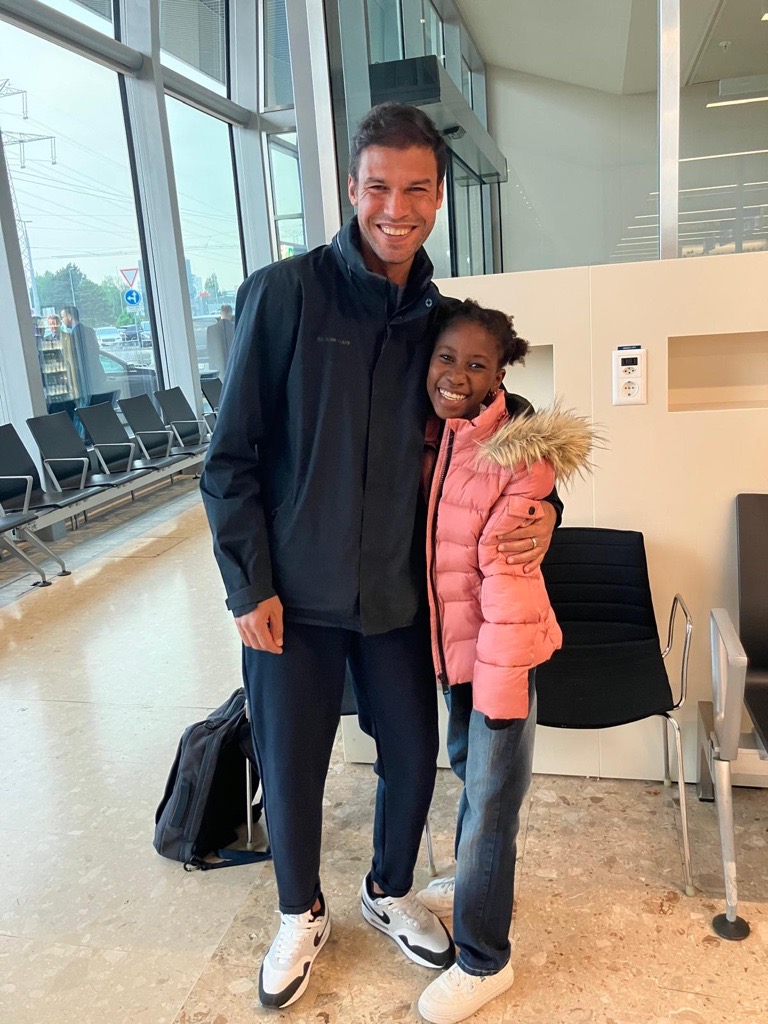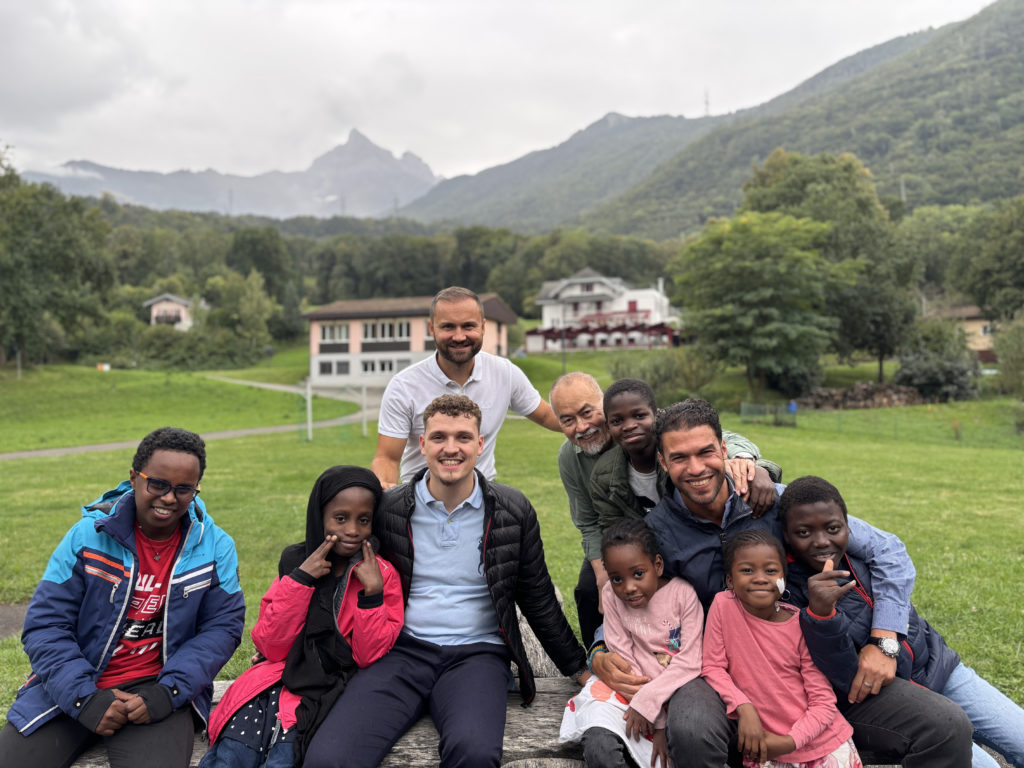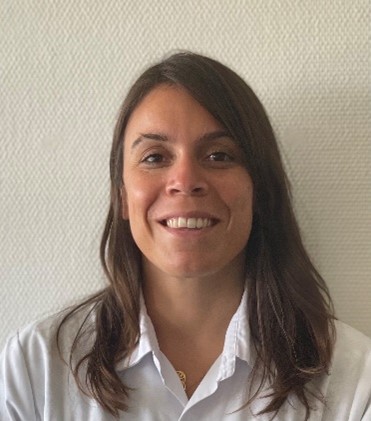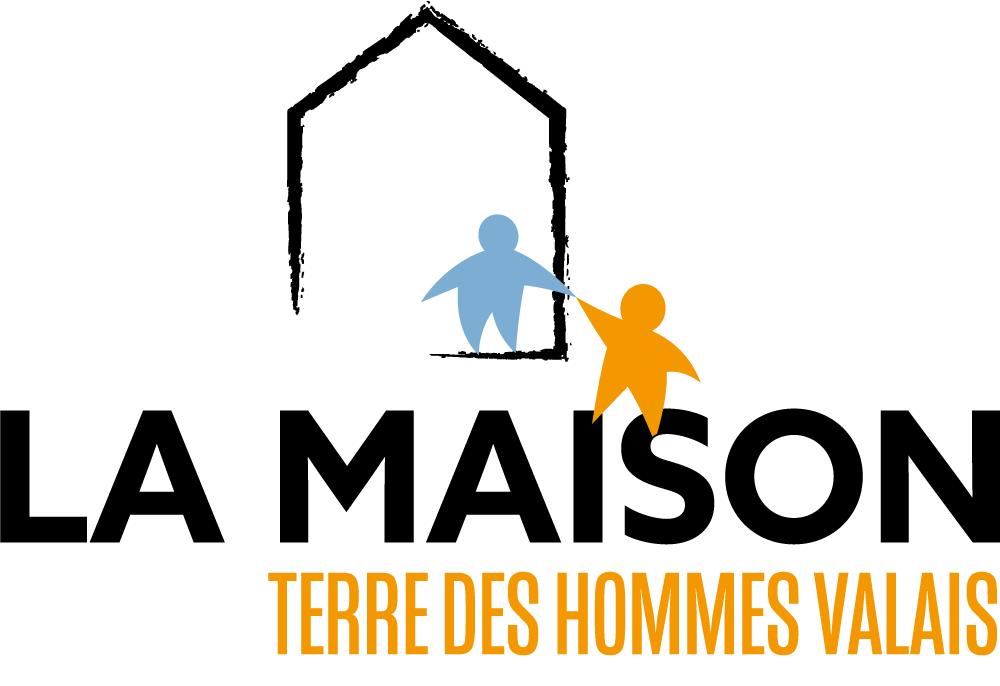A closer look at the role of a coordinator at La Maison
written on the 29.09.2025There is no such thing as a typical week for Ramzi Ghouaibia. No routine. Few moments of rest. Here, it’s not just about logistics. It’s about stories of fragile lives in delicate balance, decisive seconds, silent fears that must be gently eased.
Responsible for liaising between Geneva University Hospitals (HUG), institutional partners, and La Maison, Ramzi moves at the pace of the children he supports, always alert and attentive. Flexibility, composure and kindness guide his every step in a role where actions and words can transform hardship into hope.
Step into the discreet yet essential world of a coordinator at La Maison.
By Valérie Pellissier

“This role has taught me humility. I am proud to contribute to a concrete human project and to feel useful. Sometimes, at the end of the day, I say to myself: it’s incredible what we achieve together.”
Ramzi Ghouaibia, coordinator at La Maison
The crucial role of coordination
Every Monday at dawn, the bus leaves Massongex, taking the children to medical appointments. On board, the young residents of La Maison, still a little sleepy, set off for the HUG, accompanied by a few members of the educational team. It may seem like a routine trip, but behind the smooth operation lies meticulous logistics.
Upon arrival, Ramzi carefully ensures that the morning runs smoothly. Nothing escapes his vigilance: punctual distribution of meals, adaptation to last-minute unforeseen events, management of delays, communication with the cardiology team waiting for the young patients at the hospital. “The transition must go smoothly, and the child must be safely cared for”, he says. Every detail, often invisible to others, is a key indicator for him: a snack served on time, a reassuring word at the right moment, a thoughtful gesture to ease anxiety. All these small acts add up to make a big difference.
Welcoming in emergency, acting with calm
The next day, the scene changes. Ramzi shifts roles without pause. He heads to the airport to welcome a young patient who is often exhausted from the journey, but above all from their illness. “The arrival of a child is always a delicate moment. Before going to the HUG for an initial medical check-up, their condition must be assessed on site in the infirmary: oxygen saturation, heart rate, essential physiological parameters. Several young passengers have very worrying vital signs. With oxygen levels falling to 40 or 50%, some of them could go into shock at any moment. In those suspended moments, every second counts. The welcome must be smooth, the transition seamless. We have to act quickly and precisely, but without ever giving in to panic.”
Caring attention at every stage
Between arrivals, Ramzi juggles administrative tasks: creating files, entering the child’s medical and social data, writing updates for partners who keep worried parents informed back home. Even here, words are chosen carefully and images selected with care. “It’s important to share the reality without sugar-coating or exaggerating it. We avoid showing a child connected to complex medical devices or right after surgery. We want to inform honestly, sharing what the child is going through, without causing unnecessary worry.”
Most importantly, he takes time to visit the young residents, explain what to expect, accompany them to appointments, and plan outings. These seemingly simple exchanges carry great power. They help recreate a sense of home, where everything had been upended by the fight to survive. And in every peaceful gaze, every smile, there is a silent victory. “Helping them understand they’re not alone, that they’ll make friends, that they’ll go to school here at La Maison… that changes everything.”
The art of reading the invisible
These tasks, although discreet, are essential for the children. These reassuring words and everyday gestures transform an unfamiliar situation into a gentler, more human experience.
Ramzi’s background as an educator helps him understand the children’s reactions. Accustomed to working with young people from all walks of life, he knows how to find the right words to calm fears and dispel doubts. He notices the silences, deciphers anxious gestures, and responds with care. “We are often praised for the quality of our welcome. Today, children arrive better prepared. They know why they are here and what they will go through.” That sense of serenity, Ramzi knows, is the result of the patient and thoughtful work of the entire La Maison team.
Handling the unexpected with composure
Despite all the anticipation, unforeseen events can occur: a delayed flight, a volunteer transporter stuck in traffic, or a child not being properly explained why they are leaving their home country. These unexpected events, sometimes seemingly insignificant, can upset a child’s emotional balance. “Sometimes a parent promises to come back ‘in two hours’… and the sick child eventually realizes that is not the case. Then the emptiness sets in. They lose their bearings, and their world starts to fall apart.”
Ramzi is familiar with these moments of disruption. “When uncertainty takes over, the presence of the team becomes crucial. In those moments, we become the refuge, a foundation the child can cling to feel safe again.”
A behind-the-scenes job, yet so essential
Ramzi is not alone. He works closely with Zihret Hasanovic, regional team lead, and Heang Cavadini and Diogo Pereira. Together, they form La Maison’s coordination team. Four different perspectives and sensitivities but one shared focus: the child. They care for these young lives with great humanity, unwavering dedication, and precious compassion. Thanks to their presence and commitment, hospital stays, operations, and consultations become manageable steps in a healing journey built on trust and continuity.
A great chain of solidarity in the face of adversity
Ramzi emphasises the collective strength behind this project. “From doctors to volunteers, from godmothers to cooks, and all those who work humbly behind the scenes: everyone contributes.” This discreet choreography, often invisible but essential, forms a human chain that supports the children on their path to healing.
He speaks with deep emotion about the harrowing journey of Joseph, a young Cameroonian boy who spent fifteen days on life support, temporarily replacing the functions of his heart and lungs. Chest open, on a ventilator, he endured an incredibly vulnerable ordeal. This memory is etched into Ramzi’s mind. “In those moments, you feel utterly powerless. All you can do is wait, be there, and silently accompany.”
A discreet commitment to serving the most vulnerable
Week after week, Ramzi appreciates the richness of his work. “This role has taught me humility. I am proud to contribute to a concrete human project and to feel useful. Sometimes, at the end of the day, I say to myself: it’s incredible what we achieve together.”
And if he had to make a wish? “That more children could be treated in their own country.”
Until then, Ramzi, Zihret, Heang, and Diogo remain steady guides for these young lives. Reassuring, stable presences who comfort and connect day after day so the children at La Maison have a real chance to heal, with dignity and love.

“For the children, the coordination team is a crucial anchor. Their role goes far beyond logistics: they are a stable presence in what is often an overwhelming journey.”
Julie Wacker, Associate Professor of Paediatric Cardiology at the HUG

Hearts connected: human commitment to helping children heal
Interview with Dr Julie Wacker, Associate Professor of Paediatric Cardiology at the HUG
Committed, rigorous, and deeply committed to the children she treats, Dr. Julie Wacker works closely with the coordination team at La Maison. In this interview, she shares her journey, her passion for medicine, and highlights the vital importance of responsive and compassionate coordination.
What is your background and what led you to paediatric cardiology?
I completed most of my medical and paediatric training in Geneva, before specialising in paediatric cardiology in Australia. I also took part in several humanitarian missions in Central America. Those experiences had a profound impact on me and strengthened my commitment to children from vulnerable backgrounds. As for cardiology, I fell in love with it during my studies. It is a demanding, stimulating and deeply human speciality. Once I got a taste for it, I knew I didn’t want to do anything else.
What drives you most in your work with children?
The bond with children, without a doubt. They are authentic and sincere. When they are well, they shine, and when they are not, it is obvious. You have to adapt to each child according to their personality, age and history. That emotional richness means a lot to me.
The diversity of situations in paediatric cardiology is also fascinating. We treat everyone from 800-gram premature babies to 18-year-old adolescents. It’s a speciality where you’re constantly learning. I also love the hospital environment, the teamwork, the rigour and the continuous intellectual challenge.
You work closely with La Maison’s coordination team. What role do they play in the care journey?
For the children, the coordination team is a crucial anchor. Their role goes far beyond logistics: they are a stable presence in what is often an overwhelming journey. They ensure essential continuity from arrival at the airport to post-op follow-up. They’re the link between the many partners involved. Their often unseen work allows for smooth, safe, and reassuring care.
How does coordination between the HUG, La Maison, and other partners support your work?
It’s their responsiveness that makes all the difference. Things move fast in our day-to-day work: a surgery gets postponed, an emergency arises, a transfer needs reorganization. The coordination team adapts immediately and liaises with our admin team. Their flexibility avoids unnecessary back-and-forth and enables optimal care. Their efficiency is truly impressive.
In your opinion, what are the key elements that need to be well coordinated to ensure quality care?
Medical safety is a priority. We must be able to count on the La Maison’s team to alert us at the slightest concern. Pain, unusual symptoms, fatigue… Their vigilance and responsiveness are crucial, especially after open-heart surgery. Knowing that they are there, in direct contact with us, is extremely reassuring.
On a human level, what does this partnership between the HUG and La Maison mean to you?
It is a partnership based on trust, listening and compassion. The coordination team does not come from the medical field, but they show remarkable curiosity, great professionalism and, above all, deep empathy. They seek to understand the issues at stake so they can better support the children. It is always a pleasure to work with them.
What message would you like to send to the people working in this coordination, often behind the scenes?
A heartfelt thank you. Their commitment goes far beyond simple organisational tasks. They are an essential link in the care journey, and I am deeply grateful to them. Their work behind the scenes is fundamental, and their approach, which is always respectful, discreet and humane, is a great strength. I think few people, even within the hospital, truly grasp the scale of what they do. They know how to be present and attentive without ever being intrusive. That’s a rare quality, especially in a system as structured as ours. Their sensitivity, humanity, and effectiveness make all the difference.
